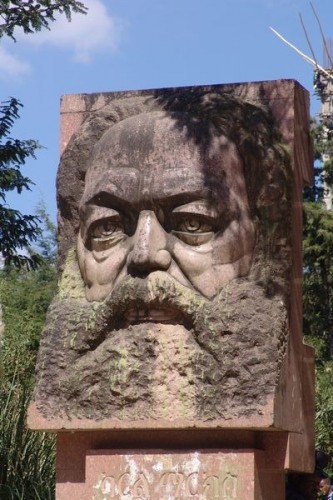 It’s unfortunate Marx was so bad at maths. Well, bad isn’t quite the right word, as he often expends a great deal of effort and creativity establishing the various mathematical conclusions he needs to establish, even when the conclusions are obvious. It’s rather wearing slogging through a whole chapter to finally get to the conclusion and realize what Marx has been trying to point out is the difference between the mean and the median. I do wonder what mathematical education was like in 19th century Prussia; Marx was an educated man, but seems to know less maths than you’ld expect from an 11 year old today.
It’s unfortunate Marx was so bad at maths. Well, bad isn’t quite the right word, as he often expends a great deal of effort and creativity establishing the various mathematical conclusions he needs to establish, even when the conclusions are obvious. It’s rather wearing slogging through a whole chapter to finally get to the conclusion and realize what Marx has been trying to point out is the difference between the mean and the median. I do wonder what mathematical education was like in 19th century Prussia; Marx was an educated man, but seems to know less maths than you’ld expect from an 11 year old today.
Except, this mathematical inability turns out to reveal something important about Marx’s method. Read more↴
 As the audience for a high-school comedy that presents detailed debates within Marxism is probably limited to, well, me, I guess The Trotsky is the closest we’re likely to get. And it’s a pretty good film, although of course I am disappointed by the limited engagement with the details of Bolshevik theory within the film. The biggest limitation is that no-one in the film seems to have any conception of anything left of liberalism, union representation and some kind of fuzzy humanitarian conception of “social justice.” Nonetheless, the adding of even the trappings of socialist politics to a high-school film is entertaining, and there are various minor moments in the film that are interesting. Read more↴
As the audience for a high-school comedy that presents detailed debates within Marxism is probably limited to, well, me, I guess The Trotsky is the closest we’re likely to get. And it’s a pretty good film, although of course I am disappointed by the limited engagement with the details of Bolshevik theory within the film. The biggest limitation is that no-one in the film seems to have any conception of anything left of liberalism, union representation and some kind of fuzzy humanitarian conception of “social justice.” Nonetheless, the adding of even the trappings of socialist politics to a high-school film is entertaining, and there are various minor moments in the film that are interesting. Read more↴
 There’s a fine line, when you encounter work close to your own, between the excitement that someone else considers your little area worth working on, and the worry that they might already have written the work that you are struggling to put together. This happened for me most recently when reading Kevin Anderson’s Marx at the Margins. As I’ve been trying to write about ways in which class reductionism misrepresents Marxism, Anderson’s detailed investigation of Marx’s writings on race, nationalism, and non-Western societies looked like it might render my gestures in that direction irrelevant. Luckily for me, Anderson’s book is actually the best sort of work to encounter, as it contains a huge amount of material on which one could build, while leaving enough theoretical space for others to do that building. Indeed, it is this combination of Anderson’s great aggregation of material with his comparatively sparse theorization of it that leads me to some thoughts about methodology for those of us attempting to construct theory through close dialog with particular texts and authors. Read more↴
There’s a fine line, when you encounter work close to your own, between the excitement that someone else considers your little area worth working on, and the worry that they might already have written the work that you are struggling to put together. This happened for me most recently when reading Kevin Anderson’s Marx at the Margins. As I’ve been trying to write about ways in which class reductionism misrepresents Marxism, Anderson’s detailed investigation of Marx’s writings on race, nationalism, and non-Western societies looked like it might render my gestures in that direction irrelevant. Luckily for me, Anderson’s book is actually the best sort of work to encounter, as it contains a huge amount of material on which one could build, while leaving enough theoretical space for others to do that building. Indeed, it is this combination of Anderson’s great aggregation of material with his comparatively sparse theorization of it that leads me to some thoughts about methodology for those of us attempting to construct theory through close dialog with particular texts and authors. Read more↴
 I was at the Mercer Gallery in Harrogate last week, which is currently showing an exhibition of photographs from Rwanda tea plantations (sponsored by local tea company Taylors). Many of the pictures were beautiful and interesting, but the exhibition troubled me. The problem is mostly the inevitable othering of the sociological gaze, and it plays out in a particularly interesting way here. Read more↴
I was at the Mercer Gallery in Harrogate last week, which is currently showing an exhibition of photographs from Rwanda tea plantations (sponsored by local tea company Taylors). Many of the pictures were beautiful and interesting, but the exhibition troubled me. The problem is mostly the inevitable othering of the sociological gaze, and it plays out in a particularly interesting way here. Read more↴
Why is localism such a big part of the green movement? I was made particularly aware of how odd this is at a meeting at the American Political Science Association recently, where the speaker argued that a critique of political economy was insufficient if it failed to critique the anthropocentric assumptions of modernity (which seems reasonable), which she equated with replacing modern political forms with an ecological politics which takes place locally, such localism apparently being “the scale of life.” I’m really not sure in what sense this could be true, especially in the context of environmentalism, where the most striking threat to life, global warming is, as the name implies, global. Read more↴
I think Lenin underestimates the genuine pathos of the Toy Story films in his review, which reinforces (and is reinforced by) his pedagogical theory of ideology, which tends to emphasize the power of cultural products to impart ideology, thereby underemphasizing why audiences accept and inhabit this ideology. To describe the emotional charge of the films as merely manipulative misses the way in which they allegorize quite real aspects of contemporary life in ways which are both insightful and genuinely affecting (which doesn’t mean they aren’t ideological). Lenin damns the films for “reminding you that your alienated, commodified relationships are perfectly normal, human, desirable and moreover actually protected as human rights in the advanced capitalist states,” but under capitalism human beings really are commodities, and to explore the emotional terrain of that condition is not mystificatory or necessarily reactionary. Read more↴
 It’s unfortunate Marx was so bad at maths. Well, bad isn’t quite the right word, as he often expends a great deal of effort and creativity establishing the various mathematical conclusions he needs to establish, even when the conclusions are obvious. It’s rather wearing slogging through a whole chapter to finally get to the conclusion and realize what Marx has been trying to point out is the difference between the mean and the median. I do wonder what mathematical education was like in 19th century Prussia; Marx was an educated man, but seems to know less maths than you’ld expect from an 11 year old today.
It’s unfortunate Marx was so bad at maths. Well, bad isn’t quite the right word, as he often expends a great deal of effort and creativity establishing the various mathematical conclusions he needs to establish, even when the conclusions are obvious. It’s rather wearing slogging through a whole chapter to finally get to the conclusion and realize what Marx has been trying to point out is the difference between the mean and the median. I do wonder what mathematical education was like in 19th century Prussia; Marx was an educated man, but seems to know less maths than you’ld expect from an 11 year old today.

 I was at the Mercer Gallery in Harrogate last week, which is currently showing
I was at the Mercer Gallery in Harrogate last week, which is currently showing